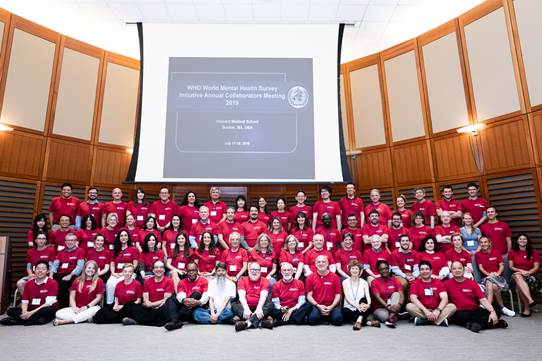
From July 16 to 19, 2019 McNeil Family Professor of Health Care Policy Ronald Kessler, PhD, hosted the WHO World Mental Health Survey Initiative Annual Collaborators’ Meeting. Eighty-five participants representing twenty-eight countries gathered at the department of health care policy and the Joseph B. Martin Conference Center to partake in this meeting.
The World Mental Health (WMH) Survey Initiative is a project of the Assessment, Classification, and Epidemiology (ACE) Group at the World Health Organization coordinating the implementation and analysis of general population epidemiologic surveys of mental, substance use, and behavioral disorders in countries in all WHO Regions. The initiative aims to obtain accurate cross-national information on the prevalences and correlates of mental, substance, and behavioral disorders. The studies of correlates analyze impairments, adverse social consequences, and patterns of help-seeking.
This year’s meeting had a special focus on the new WMH International College Student Survey Initiative. This series of mental health surveys is conducted at various universities around the world. The surveys collect epidemiological data on treatment of mental, substance, and behavioral disorders among college students worldwide. Based off this data, WMH implements and evaluates web-based interventions for prevention and treatment of these disorders and disseminates successful interventions, and studies the effectiveness of the web-based programming.
WMH workgroups met to discuss topics such as substance use disorder, relationship violence, and cities and mental health. Updates on ongoing initiatives and surveys were provided by various collaborators. The group met to discuss new surveys and best practices to improve future work. International members presented on the progress and initiatives currently taking place in their countries.
The World Health Organization (WHO) works to promote global health, keep the world safe, and serve the vulnerable. Among other initiatives, they address noncommunicable disease prevention, mental health promotion, and human capital across the life-course. WHO operates in six regions with an additional 149 field offices in countries, territories, or areas.
Kessler’s research focuses on social determinants of mental health and illness as studied from an epidemiological perspective. He is involved in evaluating a number of innovative programs for the prevention and treatment of mental illness in high-risk segments of the population. He is co-director of the World Mental Health Survey Initiative and the principal investigator of the Harvard Medical School site for Army STARRS.